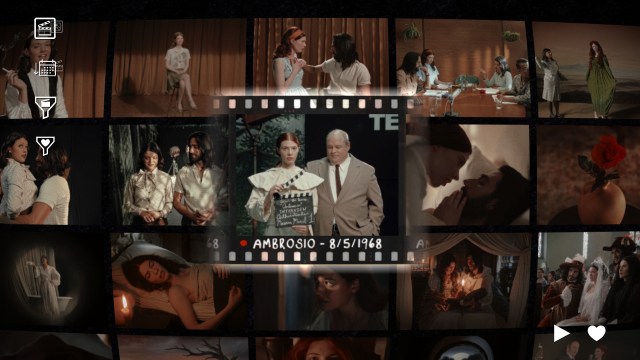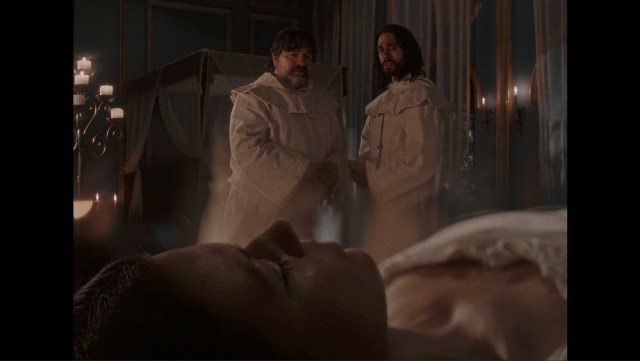Sam Barlow and the team at Half Mermaid are back with their latest project, Immortality. Upping the ante, Immortality takes the usual FMV format. Yet, it expands into multiple movies that players will sift through to uncover a single question, “What happened to the actress Marissa Marcel?”
This question permeates throughout the entire game; as you scan through her three films, looking for clues or oddities, you begin to watch as reality and scripted content meld together, becoming indistinguishable from one another.
Immortality Review | Life’s a Stage

Thanks to the new match cut system, you can pull yourself further into movie scenes Inception style by clicking on a facial expression, object, or piece of text. You will instantly be transported into another set that matches what you clicked on.
This allows you to follow threads on actors or key objects as you try to learn the fates of everyone involved in these three movies that were never released.
The three films, Ambrosio, Minsky, and Two of Everything, are incredibly distinct from one another and have been filmed for over 30 years, yet none ever saw the light of day. It’s up to the player to uncover why. While Ambrosio and Minsky were filmed back to back, Marissa Marcel was not heard from until twenty years later when she returned for Two of Everything. Another mystery for the players to solve.
Each of the three films is an entirely different genre and has a new slate of actors each time. Ambrosio harkens back to the old religion, following Marissa Marcel as a temptress who tricks a devoted priest into sin. Minsky follows a murder of an artist and the detective on the case. Finally, Two of Everything follows a rising star and her partner. All three of these films are worth the price of admission alone.

It cannot be understated how much work went into crafting all three of these films, and while you’ll inevitably watch them out or order, I was just as entranced by each of them as I was solving the actual mystery of Marissa Marcel.
Everything is not how it seems at first, and that’s key to uncovering the truth. As you become more engrossed in the surrounding mystery and watch scenes unfold, it becomes harder to tell what is a scene from a movie, or simply just these characters being genuine off script.
So many times, I’d watch a scene, thinking it was just two characters sharing a moment, but then the director’s clapboard would enter the scene to mark a cut, and I’d be reminded that these are actors playing a role. It became a fascinating back and forth between how much of ourselves we put into our art. Is life just one giant act for us to put on? These are all thoughts Immortality grapples with over its roughly six-hour runtime.
As you uncover more and more of these lost scenes, the game will outline them on a massive video grid to help sort them chronologically. You can mark scenes as favorites to help identify critical stages or ones you want to return to later. The match cut system is fluid, and you’ll often forget to back out to the grid as you quickly hop from one film to another trying to find a plot thread to latch onto.

You’ll often find scenes out of order, and everyone’s path through Immortality will vary. You could be like me, who found some essential scenes early on but didn’t have the complete picture to contextualize them properly, or you can find a more nuanced path through the game. It’s a freeform style that allows everyone to experience Immortality at a different pace.
I played through Immortality on mouse and keyboard at first, but we recommend using a controller. Not only are some of the scrubbing mechanics a little easier to use, but the game will use vibration to denote critical scenes players should examine further.
This is where Immortality begins to up the stakes. You’ll encounter new concepts as you use the second primary mechanic of the game, the scrubbing tool. We won’t spoil what happens, but using the sticks to scrub through the clips at different speeds will be most of your late-game experience with Immorality.
It’s here that the friction between what the game wants you to do and grappling with the mechanics can become a bit cumbersome. Often matching the speed would be overly fussy and tedious. At first, I enjoyed the puzzle of trying to wrestle the mechanics just right, emulating the old moviola equipment the game is based on. However, after doing it so much, I just wanted to be able to push forward and not have to struggle with the controls to align perfectly.

However, what lies underneath Immortality, the heart of it all, was so fascinating that despite the controls being the most challenging part, I kept pushing forward to see the wonderful world the team had crafted. Immortality has such a rich and deep narrative only enhanced by the cast’s excellent performances. It left me with plenty of questions, but ones that I have been thinking about since finishing the game.
It’s hard to talk around so much of this game, but the experience of pulling the curtain back makes Immortality stand among the greats. Do we put ourselves on camera in the hopes of immortalizing ourselves? When you spend so much of your life on film, at what point is everything an act, including your relationships, friendships, and life itself?
Even though the movies are finished, Immortality puts you in the director’s chair. It allows the player to experience these films at their own pace, in their own unique way. Everything said on screen and everything you read in between the lines is rich and full of depth. You might struggle to grasp the concepts at first, but if you’ve played a Sam Barlow game before, it feels like the natural evolution of the genre. Immortality stands alongside Her Story and Telling Lies as a must-play experience that will leave you with a lot to chew on.
Pros:
- Excellent performances across the board.
- The match-cut system is unique and fluid.
- A rich and deep story.
Cons:
- Scrubbing controls are a bit tedious.
- The freeform concept can leave some players struggling.
Score: 9
A copy of this game was provided to Prima Games for review. Reviewed on PC.





Published: Aug 30, 2022 09:36 am